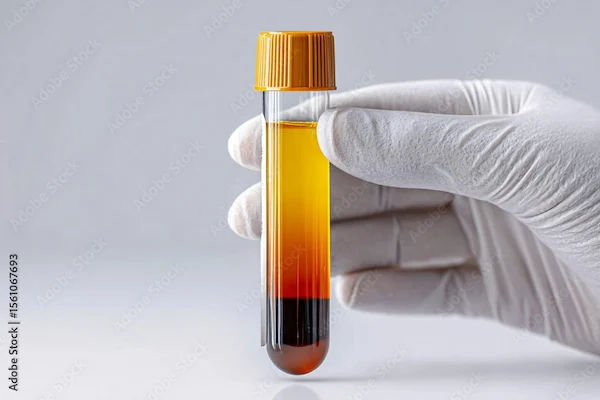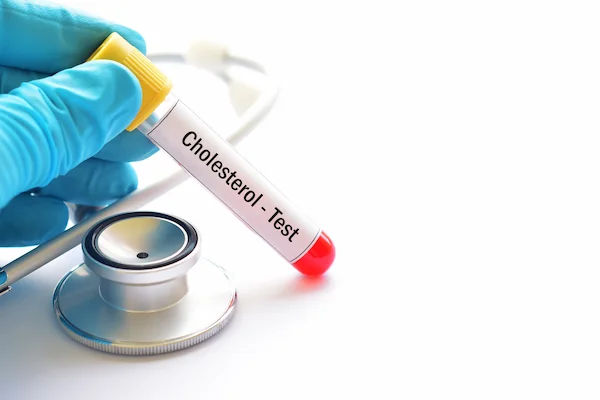Jaundice Blood Test: Bilirubin Explained
Learn how the bilirubin blood test helps diagnose jaundice. Understand what bilirubin levels indicate, the types of bilirubin, and what abnormal results may mean for liver health.

Written by Dr.Sonia Bhatt
Last updated on 21st Jul, 2025

Jaundice is a common condition that causes yellowing of the skin and eyes. It happens when there’s too much bilirubin—a yellow pigment—in the blood. If you or a loved one has been diagnosed with jaundice, your doctor may recommend a bilirubin blood test to check your liver function and overall health.
What is Bilirubin?
Bilirubin is a waste product formed when old red blood cells break down. The liver processes bilirubin and removes it from the body through bile (a digestive fluid). Normally, bilirubin levels stay low because the liver efficiently filters it out. But if the liver isn’t working properly, bilirubin builds up, leading to jaundice.
Types of Bilirubin
1. Unconjugated (Indirect) Bilirubin: This form is not yet processed by the liver. High levels may indicate excessive red blood cell breakdown.
2. Conjugated (Direct) Bilirubin: This is the processed form, ready to be excreted. High levels suggest a liver or bile duct problem.
3. Total Bilirubin: The sum of both direct and indirect bilirubin.
Why Do You Need a Bilirubin Test?
Your doctor may order a bilirubin test if you have:
Yellow skin or eyes (jaundice)
Dark urine or pale stools
Fatigue, nausea, or abdominal pain
A history of liver disease (like hepatitis or cirrhosis)
Newborn jaundice (common in babies)
This test helps diagnose:
Liver disorders (hepatitis, cirrhosis)
Blocked bile ducts (gallstones, tumours)
Blood disorders (hemolytic anaemia)
Infections affecting the liver
How is the Bilirubin Test Done?
A simple blood test is used to measure bilirubin levels. Here’s what to expect:
1. Preparation: You may need to fast (avoid food) for 4-6 hours before the test.
2. Procedure: A healthcare professional will draw blood from your arm.
3. Results: Usually available within a day.
Normal Bilirubin Levels
Total Bilirubin: 0.3: 1.2 mg/dL
Direct Bilirubin: 0.1: 0.3 mg/dL
Indirect Bilirubin: 0.2: 0.9 mg/dL
Higher levels indicate jaundice and possible liver or blood disorders.
Consult Top Specialists
What Do Abnormal Results Mean?
High Bilirubin (Jaundice Causes)
Liver Damage (Hepatitis, cirrhosis, alcohol abuse)
Bile Duct Blockage (Gallstones, tumours, inflammation)
Excessive Red Blood Cell Breakdown (Hemolytic anaemia, malaria)
Newborn Jaundice (Common in babies due to immature liver)
Low Bilirubin
Low bilirubin is usually not a concern but may be seen in certain medications or conditions like iron deficiency.
How to Manage Jaundice & Lower Bilirubin?
If your bilirubin levels are high, your doctor will determine the underlying cause and suggest treatment. Here are some general tips to support liver health:
1. Stay Hydrated
Drink plenty of water to help flush out toxins.
2. Eat a Liver-Friendly Diet
Fruits & Vegetables (Apples, beets, carrots, leafy greens)
Lean Proteins (Fish, chicken, lentils)
Whole Grains (Oats, brown rice)
Avoid Fatty & Processed Foods (Fried foods, excessive sugar)
3. Limit Alcohol & Medications
Alcohol can worsen liver damage.
Some painkillers (like acetaminophen) can harm the liver if taken excessively.
4. Exercise Regularly
Moderate exercise helps improve liver function.
5. Get Enough Sleep
Rest helps the body heal and detoxify.
6. Follow Medical Advice
If jaundice is due to an infection (like hepatitis), medications may be needed.
Newborn jaundice often improves with phototherapy (light treatment).
When to See a Doctor?
Seek medical help if you notice:
Persistent yellow skin/eyes
Severe abdominal pain
Dark urine or pale stools
Unexplained fatigue or weight loss
If you suspect jaundice or need a bilirubin test, you can easily book a blood test or consult a doctor through Apollo 24|7. Early detection helps in better management and recovery.
Conclusion
Jaundice is a sign that your liver needs attention. A bilirubin blood test helps identify the cause so that proper treatment can be given. By maintaining a healthy lifestyle and following medical advice, you can support your liver and overall well-being.
If you have concerns about jaundice or liver health, don’t hesitate to reach out to a healthcare provider.
Consult Top Specialists
Consult Top Specialists

Dr. Syed Ismail Ali
General Practitioner
7 Years • MBBS
Hyderabad
Apollo 24|7 Clinic, Hyderabad

Dr D M Karthik
General Practitioner
4 Years • MBBS, Fellowship in Diabetes Mellitus, Advance certificate in Diabetes Mellitus, Derma Nutrition Certification
Visakhapatnam
Apollo 24|7 Clinic - Andhra Pradesh, Visakhapatnam

Dr. M L Ezhilarasan
General Practitioner
6 Years • MBBS
Visakhapatnam
Apollo 24|7 Clinic - Andhra Pradesh, Visakhapatnam

Dr. Mohammed Kamran
General Practitioner
5 Years • MBBS, FIDM
Nashik
Apollo 24|7 Clinic - Maharashtra, Nashik

Dr. D Bhanu Prakash
General Practitioner
10 Years • MBBS, AFIH, Advanced certificate in critical care medicine, Fellowship in critical care medicine
Hyderabad
Apollo 24|7 Clinic, Hyderabad
Consult Top Specialists

Dr. Syed Ismail Ali
General Practitioner
7 Years • MBBS
Hyderabad
Apollo 24|7 Clinic, Hyderabad

Dr D M Karthik
General Practitioner
4 Years • MBBS, Fellowship in Diabetes Mellitus, Advance certificate in Diabetes Mellitus, Derma Nutrition Certification
Visakhapatnam
Apollo 24|7 Clinic - Andhra Pradesh, Visakhapatnam

Dr. M L Ezhilarasan
General Practitioner
6 Years • MBBS
Visakhapatnam
Apollo 24|7 Clinic - Andhra Pradesh, Visakhapatnam

Dr. Mohammed Kamran
General Practitioner
5 Years • MBBS, FIDM
Nashik
Apollo 24|7 Clinic - Maharashtra, Nashik

Dr. D Bhanu Prakash
General Practitioner
10 Years • MBBS, AFIH, Advanced certificate in critical care medicine, Fellowship in critical care medicine
Hyderabad
Apollo 24|7 Clinic, Hyderabad




